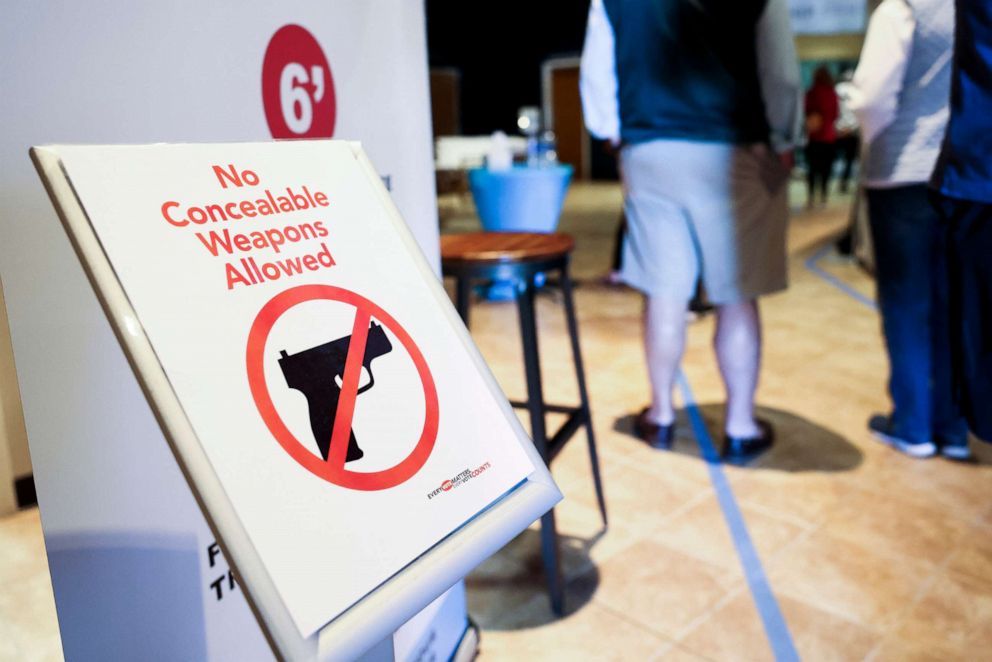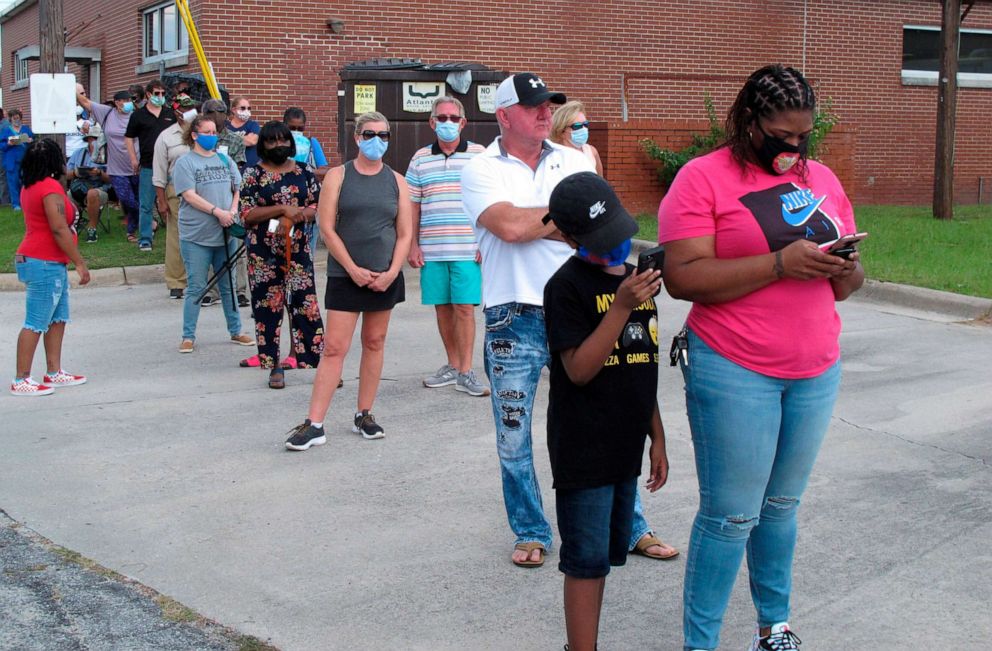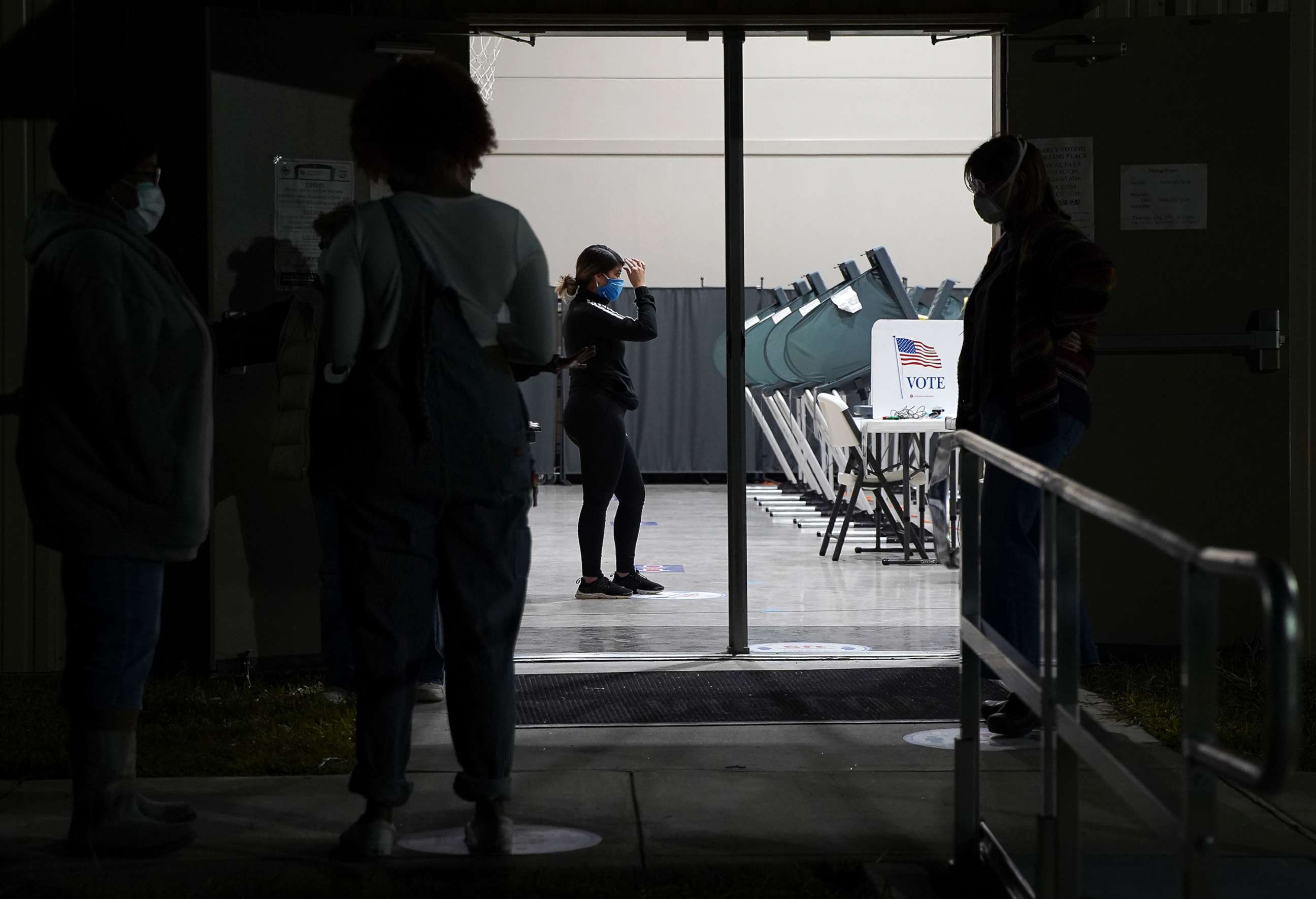Poll workers contemplate an unusual challenge: gun-toting voters
"Brandishing firearms is actually a form of voter intimidation," an expert said.
When more than 750 poll workers and Election Day volunteers gathered on Zoom this week for a training session on conflict de-escalation techniques, one topic appeared over and over again on the Q&A screen: "What if a person or voter is carrying a gun?"
It is a question that has garnered unusual attention this election season -- in court fights, inside government and law enforcement circles, and within advocacy groups working to make sure this year's heated political climate does not erupt into something worse. Authorities in several states said they are prepared.
"We're protected for this election and voters can cast their ballots with confidence," Pennsylvania Gov. Tom Wolf said Thursday. "We're going to have a fair election where everyone can vote without interference. Everybody can vote without intimidation."
Pennsylvania Secretary of State Kathy Boockvar told reporters Friday the state's task force on Election Day safety has done constant monitoring and said that so far, "there's not been anything reported that's been of immediate concern."
Still, across the country, everyone from poll workers to police are getting guidance on how to respond if someone carries a firearm to a polling station, said Vanita Gupta, president and CEO of the Leadership Conference on Civil and Human Rights and the former head of the Department of Justice's civil rights division during the Obama administration.
Gupta said it is a tricky subject to address, because there is a risk the subject may "scare voters in this moment," but she said poll workers are being advised to intervene if someone is carrying a gun and it makes voters feel uneasy.
"Brandishing firearms is actually a form of voter intimidation," she said.

Gupta said police are undergoing training to know when to intervene and state attorneys general have been sharing guidance and setting up an Election Day helpline for major city police chiefs to offer advice to navigate any incidents.
Anxieties have surfaced in a year that has already seen pockets of social unrest and a series of unsettling incidents can do. Twice this year authorities interrupted plots to kidnap or kill governors, and last week three men with alleged ties to a white supremacist extremist group were charged with federal firearms violations after drafting what appeared to be a list of targets for assassination. This week, Walmart took the unusual step of briefly removing guns and ammunition from their shelves, citing concerns about civil unrest, but returned them after the incidents "remained geographically isolated," according to a company statement.
The elections are coinciding with an uptick in gun sales that began with the onset of the global coronavirus pandemic. The Trace, a nonprofit news organization that focuses on gun issues, reported this month that Americans bought 15.1 million guns from March through September, a 91% increase from the same period in 2019.
An analysis from the Brookings Institution said anxiety about personal safety from the pandemic and increased racial unrest may have contributed to the spike.
All of this has registered with voters. About seven in 10 voters say they are anxious about safety issues tied to the upcoming election, according to an Associated Press-NORC poll this month.

Both the public sector and private organizations have been making preparations in response to those indicators. In Pennsylvania, Wolf described how police and federal law enforcement have been conducting table-top exercises to be ready to respond to election-related violence. In Michigan, Secretary of State Jocelyn Benson issued a directive banning firearms at polling places, although her action was rejected this week by an appellate court, which said voter intimidation was already illegal in the state.
In its 3-0 decision, the Michigan Court of Appeals said voter intimidation is already illegal in the state, according to the AP. "Anyone who intimidates a voter in Michigan by brandishing a firearm or, for that matter, by threatening with a knife, baseball bat, fist, or otherwise menacing behavior, is committing a felony under existing law," the court said.
Michigan Attorney Dana Nessel vowed Thursday to "immediately" appeal, citing a poll released by the Detroit News and WDIV-TV that indicated that 73% of Michigan voters say openly carried guns should be banned near polling places.
"The merits of this issue -- which impacts all Michiganders -- deserves full and expedited consideration by our State's highest court," Nessel said in a statement.
One Michigan resident who attended the training session this week, which was organized by the League of Women Voters, asked the moderators for guidance: "At what point, if we see someone with a gun, is it a situation we should be calling for help?"
Public officials and advocacy groups have faced the unusual challenge of trying to prepare for incidents and counsel safety without unduly frightening people and deterring them from showing up to vote. Liza Goitein, who co-directs the Brennan Center for Justice's Liberty and National Security Program, said it's important to remember that these issues are not new.
"Everyone is focused on it this year, but voter intimidation is something that happens every election and poll workers receive extensive training on how to handle it," Goitein said. "There is always training around elections. But this year specifically there has been a concerted effort to have law enforcement aware of the issues."
Goitein said training sessions, like the one organized this week, prepare regular citizens and poll workers alike as "the first line of response" should a situation arise.
"You might have community members in the area working to de-escalate a situation," she said.

Poll workers, too, are being trained to use time-honored techniques to maintain calm in most situations. Experts leading the League of Women Voters training sessions urged workers to practice and role-play scenarios so they would be ready to de-escalate a situation if tempers flared. But trainers were also clear that they could not train volunteers "for immediate life-threatening incidents."
Though there is a long tradition, born out of the civil rights era, to keep police or other law enforcement officials away from voting locations, Goitein said there could be scenarios where they are summoned to help.
"If it escalates to the point where [poll workers] cannot handle the situation, then it is appropriate for the election officials to call in law enforcement," she said.
Ultimately, law enforcement officials on the ground can and should protect against any violence that arises at polling locations," said Cassie Miller, a senior research analyst for the Southern Poverty Law Center.
"[Violent] activity on the ground should not be tolerated and paramilitary laws, which exist in every state, should be enforced," she said.




